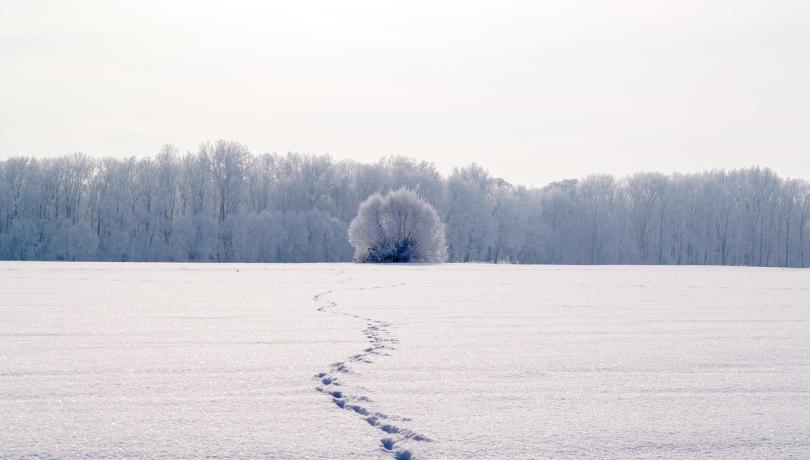In this month's "In Depth" section we talk about the importance of the human footprint on Earth through the analysis of two internationally recognized literary pieces: 'Brother in Ice', by Alícia Kopf, and 'Footprints', by David Farrier.

We are now at a moment in human history in which we are aware of our power, influence on the environment and capacity for massive destruction. The impact of human activity is increasingly profound and evident on many levels. Climate change, ocean acidification, the intensive exploitation of resources and uncontrolled waste disposal are all having devastating effects on a society that is increasingly connected, but at the same time quite isolated and detached from the natural environment. This is why the challenges we face are so great, and the solutions, in many cases, seem unfeasible.
A few weeks ago, Valentí Sallarès, the director of the Institut de Ciències del Mar (ICM-CSIC), moderated "The Ice Library", a two-way conversation between writers Alícia Kopf and David Farrier on content related to two of their most internationally recognized books: Alice's Brother in Ice and David's Footprints. Both works talk about the importance of the footprints of our actions and our experiences, to know how to recognize and interpret them to understand where we come from and where we are coming from.
Specifically, Brother in Ice is the research diary of the author, attracted since she was a child by polar expeditions and their striking imagery. It shows us the parallelism between the exploration and discovery of new worlds, increasingly remote and isolated, and the inner search, the discovery of new realities through the evolution of relationships with ourselves and our immediate environment, especially the family, but also through love and friendship.
Footprints, on the other hand, combines history, science, and philosophy to invite us to reflect on our relationship with the planet, the impact of our actions on the climate, ecosystems, resources, and the footprint that our activities will leave in the future. In a context of multiple global crises and pessimistic determinism, Footprints provides a mature and conscious vision of the transformations to come and the need to adapt through knowledge.
Both Brother in Ice and Footprints share an "oceanic" mood and vision in their approach, highlighting the almost mystical attraction of travel and exploration as the driving force of discovery, the need to reach further and better understand ourselves as individuals and as a species, and to understand our environment and its vulnerability, as well as our primordial role in the fragile interrelationships that guide the evolution of the system.
Curiosity, the key to exploration
Imagination and curiosity, inherent to human nature, are mandatory to make exploration possible. "Interesting things happen all around you and you just have to know how to look at them", said Antonio López. Knowing how to look or, as ecologist Marten Scheffer recently expressed at the Ramon Magalef Award ceremony, to take advantage of "the power we have as artists and scientists to make sense of the world around us".
It is the capacity mentioned by Alicia Kopf in Brother in Ice to "make the invisible visible", to remove the veil and show it to the world, with the snowflake as a metaphor: how the hexagonal formation of the ice flake reveals its molecular structure, intimate, but at the same time unique due to the conditions that influence its growth.
From both works, then, we learn that exploration is a rich and multifaceted concept, applicable to both interior and exterior levels, and that it implies going out of oneself, "being there, looking out, instead of here, looking in", as Louise Boyd Land expressed, and assuming the risks that adventure entails. It is daring to make mistakes, to err, to suffer, to harm, but also to enjoy, to marvel, and to love. It is, in short, daring to live. As Pepita Castellví, Catalan oceanographer and Antarctic pioneer in Spain, pointed out paraphrasing Shackleton, "the polar areas leave a deep impression on those who have been there, but it is difficult to transmit to those who have never left the civilized world".
In conclusion, what is becoming increasingly evident is that the continuous expansion of horizons and the limits of knowledge entails a growing responsibility. We are increasingly aware of the often irreparable consequences of our actions and decisions, but all indications are that we are not yet mature enough as a species to control our power. Too often exploration is driven by the atavistic instinct for glory, conquest, dominance and control, change and destruction.
The challenge, as both Brother in Ice and Footprints suggest, is to transform our relationship with our immediate and distant environment, to take advantage of the knowledge provided by the arts and sciences to make sense of the world and show it to society, since, as Dr. Pi y Sabater said, "we only love what we know, and we only preserve what we love".